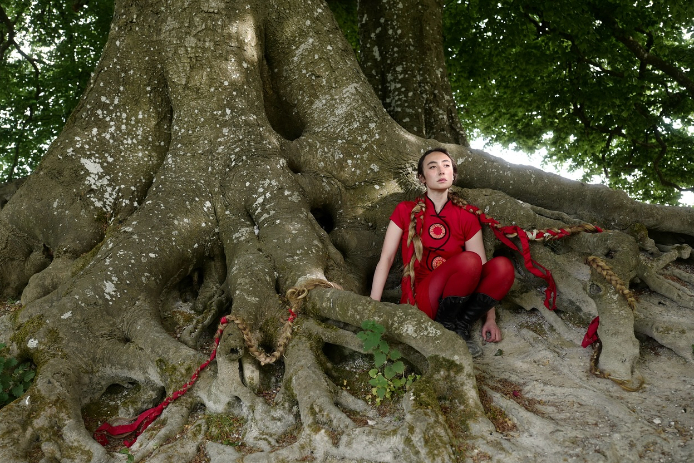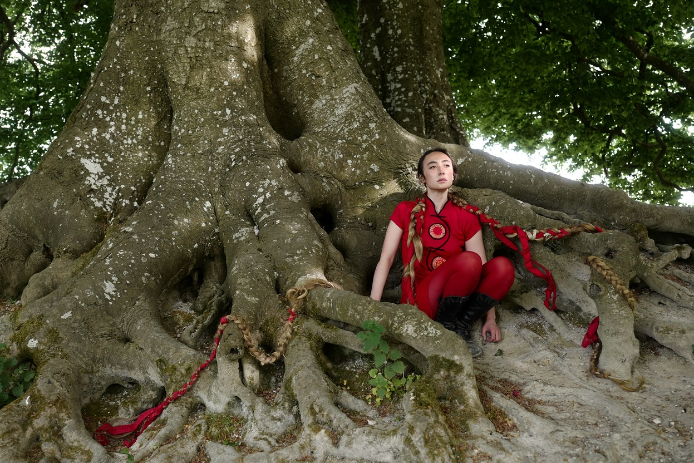Foto: Amoline Studio
-The rabbit is the luckiest of the animals.
- I always have a strange sense that these good, but sort of spooky things happen to me, says London-based Ann Liu Cannon, who this July released her debut album Clever Rabbits.
Clever Rabbits is a sonically experimental album that combines adolescent angst, folktales and imagination, thus drawing the listener into a hypnotic, playful and slightly surreal experience.
In the UK, Liu Cannon’s unique music, which includes elements from experimental and 70s-folk revival music, is already creating ripples. Clever Rabbits has made it to the official charts - number 20 on independent albums and number 13 on the folk albums charts.
– Like the School of Rock
Born and raised in Wiltshire to a British father and Chinese mother, Liu Cannon moved to London at the age of 18. There she quickly burrowed herself into the underground music scene and found a home in Camden’s Spiritual Bar.
- It was my training ground. Like the School of Rock. Only far less jovial and way more angsty, she says about The Spiritual, which serves as a live music venue, record label and recording studio.
Last August, Liu Cannon released her debut-EP CHALK, recorded at Spiritual Records. The EP is an emotional yet hopeful record that processes the death of her father and is thematically tied to the chalk landscapes of Wiltshire.
The live-recording of False Hope from Spiritual Studio Sessions that put Liu Cannon on producer Ethan Johns' radar.
Worked with dream producer
Clever Rabbits was released on Liu Cannon’s own label, JJ Records. It is produced in cooperation with Ethan Johns (Ryan Adams, Laura Marling, Paul McCartney), who discovered Liu Cannon in 2020.
- The owner of Spiritual Bar, Rafael, took a video of me performing a song and put it up on YouTube.
- The next day we went into lockdown. He sent me a message saying, “I'm gonna send this video to my friend.”
- I was like, “yeah, cool,” and didn't think anything of it.
A few hours later, she received a message saying that Ethan Johns wanted her number.
- He had produced these really important albums from my childhood, like Laura Marling’s I Speak Because I Can.
- Teenage me was obsessed with that record. So, to have Ethan Johns call me was crazy.
Purposefully genre-defying
Liu Cannon wrote the songs on Clever Rabbits in her late teens and early twenties. She is now 26.
The genre-defying aspect of Liu Cannon’s music is purposeful on her part.
- I was in this folk and blues, singer-songwriter environment, she says, referring to Spiritual Bar.
- So, I wanted my music to not sound like a straightforward singer-songwriter, folk thing.
- I wanted to set a precedent from the start, that there will be unexpected things and that's part of what I like to do with my work.
Liu Cannon is classically trained. The violin was her first instrument. Today, she is a multi-instrumentalist. Growing up, she took singing lessons in her village.
Of her vocal coach, she says:
- She was emphatic about the importance of breath and presence more than anything else.
It’s clear that the singing lessons have paid off. Liu Cannon’s vocals range seamlessly from soft vibrato to powerful rasps, always containing a multitude of emotions.
Folktales as a way of understanding the self
Thematically, much of Clever Rabbits is about identity and self-actualisation.
- To go through [self-actualisation], you may go through a time of self-absorption. Your inner world becomes your entire world.
Liu Cannon turned to folk tales to learn more about herself.
- As a kid, I wanted to feel close to my dual heritage.
- When I was trying to understand who I was, folk tales felt like a good way to get to the true essence of the cultures. To see how a culture writes about itself.
- My father was a writer, and my mum is too. Stories and the written word are so powerful and have always moved me, more than music sometimes.
- I love when binaries come together to make a third thing
To create a unique soundscape that reflects her inner world and cultural heritage, Liu Cannon has used some unusual sonic combinations on Clever Rabbits
- The whole album is about myself and The Other. Two people create a third thing - the relationship they have.
- Sonically, I wanted digital and analog sounds to combined create a distinctive sound.
- I looked at my dual heritage, and wanted the sonic spaces to reflect these polar opposites – China and England.
- We played samples of raw, organic sounding instruments on the mellotron. They sound kind of clunky.
- I love when binaries come together to make a third thing.
- The mellotron gave me the perfect marriage of digital, real and not real. At Least It’s Warm has a lot of mellotron on it.
Foto: Amoline Studio
- Mimics the sound of a rabbit hopping around
Liu Cannon chose to move away from typical choices when it came to percussion as well.
- I knew that with a drumkit many of the songs would instantly sound more bluesy or country. If you take the drum kit away and replace it with a woodblock, you can't place the song anywhere quite so easily.
- The clunky part you hear on the Clever Rabbits single, is woodblocks. They were perfect because they mimic the sound of a rabbit hopping around.
Sonic contrasts follow the album from start to finish. The first song, Jealous God, is about a love triangle.
- It's powerless, powerful and prophetic at the same time. It has an orchestral and organic sound.
- The last song, Gobbleknoll, is more digital, modern and hopeful. It creates a sense of letting go, of saying I need to look forward now.
Rabbits in churches and in caves
Under the Chinese calendar, Liu Cannon is a rabbit. The animal became a central and formative symbol on the debut album.
- There’s this circular symbol of three rabbits that appears in churches in Dartmoor and in caves in Eastern China. My dad was raised on Dartmoor and my mum in China.
- Separate to that, there's a Chinese idiom which says clever rabbits need three burrows.
The idiom became the inspiration for the album’s title track.
- I identify with many of the rabbit’s traits. Rabbits are prone to burrow and have a home.
- A rabbit will also stay near its burrow, and if it senses danger it won’t move until the very last moment, then make a dash for it.
The hill that ate people
Gobbleknoll is inspired by an anglo-celtic folktale by the same name. Liu Cannon discovered Alan Garner’s retelling of the tale.
- I opened this book and the first story was Gobbleknoll. It read “there once was a hill that ate people.”
- This rabbit wanted to defeat the hill. The hill is the rabbit's home. Then the rabbit goes “I'm gonna kill [the hill].”
- In the original story, the rabbit goes into the hill and rips out its guts. The innards feed him and his grandmother for years.
- My story follows the folktale till killing the hill.
- But once I've done that, I'm like, “hang on! If I killed the hill, I don't need to live there.”
- Maybe I'm not even a rabbit at all. Maybe I’m something else.
Submarines and panic attacks
Landscapes, both real and imaginary, develop characteristic traits on the album.
Liu Cannon's storytelling moves through gritty, urban sites, pre-historic places, folklore and an anxiety-induced inner landscape.
- When I was writing these songs, I was quite reserved and anxious. When you're in an anxious headspace, you’re very responsive to your environment.
- When you're prone to having an anxious disposition, you do kind of live in your own world. That can be sad, and you can miss out on reality. But you also have a very active imagination, which I tapped into.
- Often, if I was feeling a certain type of way, I would have a vivid sense of a particular metaphor that could explain it.
Good Submarine is based on a metaphor.
- I have extreme panic attacks. When I’m in them, I feel like a submarine that's completely submerged in a deep sea, and no one can get through to me.
- But to be a good submarine, you are somewhat complacent and go “wow, I'm really good at having panic attacks!”
Foto: Music video from debut EP CHALK
- I want to ground every song in something more experienced than myself
The landscapes and cultures which Liu Cannon is connected to, seem to have shaped her imagination. Both her home county Wiltshire and Dartmoor, where her father grew up, are counties steeped in folklore and myth.
She also has family from Cornwall, where she has walked amongst the Mên-an-Tol – pre-historic standing stones used in fertility rituals – and which have inspired her song named after them.
- Every song I write, I want to ground in something far more experienced than myself.
- Jealous God came from The Ten Commandments.
- I was walking around in my local parish church back in Wiltshire, and I saw the words written there – “Your Lord God is a jealous God.”
- This album was sort of made for the Spiritual Bar. The songs were all written to perform for the people there, and they’re about all these situations that were happening there.
- But the themes are drawn from various locations. I would like to always work to be grounded somewhere.
- I need to do it myself
The Spirtual’s community-focused, DIY approach to music, seems to have rubbed off on Liu Cannon, who has ambitions to turn her own label into a community space. The vision is a place where people can come to write, record or gain advice.
- That’s the dream, but it’s going to take a few years.
- I just needed to do it myself, she says about founding her own label.
- If I want a sustainable career in music, this is what I need. I can't just wait around for someone to come and help.
Clever Rabbits - Spotify












